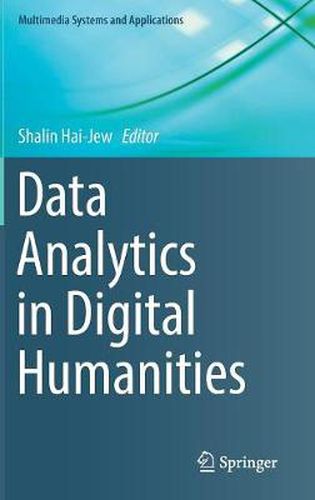Readings Newsletter
Become a Readings Member to make your shopping experience even easier.
Sign in or sign up for free!
You’re not far away from qualifying for FREE standard shipping within Australia
You’ve qualified for FREE standard shipping within Australia
The cart is loading…






This title is printed to order. This book may have been self-published. If so, we cannot guarantee the quality of the content. In the main most books will have gone through the editing process however some may not. We therefore suggest that you be aware of this before ordering this book. If in doubt check either the author or publisher’s details as we are unable to accept any returns unless they are faulty. Please contact us if you have any questions.
This book covers computationally innovative methods and technologies including data collection and elicitation, data processing, data analysis, data visualizations, and data presentation. It explores how digital humanists have harnessed the hypersociality and social technologies, benefited from the open-source sharing not only of data but of code, and made technological capabilities a critical part of humanities work. Chapters are written by researchers from around the world, bringing perspectives from diverse fields and subject areas. The respective authors describe their work, their research, and their learning. Topics include semantic web for cultural heritage valorization, machine learning for parody detection by classification, psychological text analysis, crowdsourcing imagery coding in natural disasters, and creating inheritable digital codebooks.Designed for researchers and academics, this book is suitable for those interested in methodologies and analytics that can be applied in literature, history, philosophy, linguistics, and related disciplines. Professionals such as librarians, archivists, and historians will also find the content informative and instructive.
$9.00 standard shipping within Australia
FREE standard shipping within Australia for orders over $100.00
Express & International shipping calculated at checkout
This title is printed to order. This book may have been self-published. If so, we cannot guarantee the quality of the content. In the main most books will have gone through the editing process however some may not. We therefore suggest that you be aware of this before ordering this book. If in doubt check either the author or publisher’s details as we are unable to accept any returns unless they are faulty. Please contact us if you have any questions.
This book covers computationally innovative methods and technologies including data collection and elicitation, data processing, data analysis, data visualizations, and data presentation. It explores how digital humanists have harnessed the hypersociality and social technologies, benefited from the open-source sharing not only of data but of code, and made technological capabilities a critical part of humanities work. Chapters are written by researchers from around the world, bringing perspectives from diverse fields and subject areas. The respective authors describe their work, their research, and their learning. Topics include semantic web for cultural heritage valorization, machine learning for parody detection by classification, psychological text analysis, crowdsourcing imagery coding in natural disasters, and creating inheritable digital codebooks.Designed for researchers and academics, this book is suitable for those interested in methodologies and analytics that can be applied in literature, history, philosophy, linguistics, and related disciplines. Professionals such as librarians, archivists, and historians will also find the content informative and instructive.